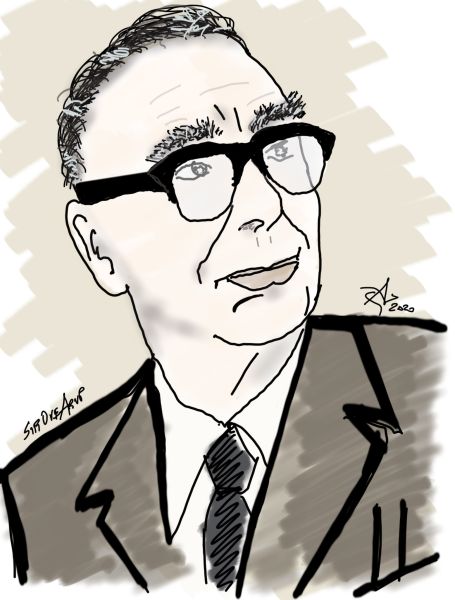Modern Society demands and seeks experts (we all need experts) but that often does not offer many places where experts should be trained as we need, or worse, not everyone is given the opportunity to attend these places. The Latin statement homo faber fortunae suae is certainly true, but in a certain way, I am personally tied to a Machiavellian vision of this concept because it better describes the true reality. Specifically, I refer to the extent to which luck and virtue contribute to training the professional man. Luck is simply the Opportunity, but afterwards to maintain the advantage and the possibility granted you need to be virtuous, obviously. Everything starts from an opportunity, from an opportunity you can generate positive or less positive paths. But we must never forget that granting or denying an opportunity without the right sense of proportion (between requests and expected results) can represent the beginning of the failure of modern society.
Anyway, I would like to suggest you read, if you like, one of the teachings of Sir Ove Arup which for me is the most significant. I think it is excellent food for thought and a warning to encourage large and small firms and engineering companies to invest more and more in opportunities and in those people who show constructive curiosity.
Equality of opportunity
from the Key Speech by Sir Ove Arup, 1970 (full version below)
You have certainly a point there. Of course I am discriminating in favour of quality, and I would do anything to enable our bright people to use their talents. You cannot equate excellence with mediocrity, you cannot pretend they are the same. We would be sunk if we did that.
We need to produce works of quality, and we need those who can produce them. One perfect job is more important for the morale of the firm, for our reputation for producing enthusiasm, than 10 ordinary jobs, and enthusiasm is like the fire that keeps the steam-engine going. Likewise one outstanding man is worth 10 men who are only half good. This is a fact of life we cannot change. It is no good pretending that all are equal – they aren’t. There should be equality before the law, and as far as possible equality of opportunity, of course. But the fact that you are good at something is something you should be grateful for, not something to be conceited about. It doesn’t mean that you are better as a human being. And there are probably many other things you are hopeless at. No man should be despised or feel ashamed because of the work he does, as long as he does it as well as he can.
What we should aim at, naturally, is to put each man on to the work he can do. And, fortunately, there is nearly always something he can do well. We will have square pegs in round holes, we shall have frustrated people, unfortunately – those who are not frustrated one way or another are in the minority. But fortunately, people vary, as jobs vary, and few would want to do the job another calls interesting if they are no good at it. If we can reach a stage where each man or woman is respected for the job they do, and is doing his or her best because the atmosphere is right, because they are proud of what we are and do and share in the general enthusiasm, then we are home.
And each job is important. Secretaries, for instance. They could have a tremendously civilising influence on our staff. They could teach them to write English, for instance, a most important and necessary job. But secretaries who can do that are of course at a premium. We must try to find them. It is even more important than that they are good-looking – and nobody could accuse me of being indifferent to that. Our messengers and cleaners – how important it is that they are reliable and likeable, human, with a sense of humour. A cheerful remark can brighten the day. All our people are part of us, part of our ‘image’, create the atmosphere we live in. But it doesn’t alter the fact that the services of a messenger are less valuable to the firm than those of a gifted designer or an imaginative mechanical engineer, a fact that even the messenger will understand.
But there are of course people we cannot employ usefully. Masses of them, in fact. Those we should not take on, obviously, except on a strictly temporary basis. But sometimes they are found inside the firm. They may have been good once, but are on the way down. I am a case in point myself. But their loyal service, their place in the hierarchy, makes it difficult to de-grade them. To deal with them requires much tact, and is embarrassing. But they should not be allowed to pretend to do jobs they are no good at. They must not prevent the good ones from functioning. It’s a problem all firms have, it’s one of the cases where humanity and efficiency clash. To resolve it tactfully may be expensive, not to resolve it is fatal.
So far I haven’t said much about solvency. Stuart Irons (the financial director) can tell you something about that. I compare it to stability in engineering structures – without it the whole thing collapses but if you have much more money than you need the usefulness of it declines until it becomes distracting and dangerous. That danger need not worry us for the time being. At the moment the need for solvency is restricting, and is the most frequent cause of having to compromise. That we may have to do – but let’s not do it unnecessarily, and let’s get back on course.
And Unity and Enthusiasm, the last item, is in a way what my talk has been about. It is a question of giving the firm an identity. What do we mean, when we speak about the firm, about ‘we’ or ‘us’? Is it the whole collection of people in dozens of offices in different places? Are ‘we’ all of them or some of them, and which? I think it is unavoidable that ‘we’ should mean different things in different contexts. Sometimes what is said is only relevant to the upper layers of management, sometimes it is meant to include everybody. What we must aim at is to make ‘we’ include as many as possible as often as possible. To increase the number of those who have a contribution to make, however small, who agree wholeheartedly with our aims and want to throw in their lot with us. We might think about them as members of our community, the others, who come and go, might be called staff. Of course there can never be any clear line of demarcation, it is not a question of signing a form or bestowing a title, it is a matter of how each feels and what we feel about them. For it is a two-way business.
But what binds our membership together must be loyalty to our aims. And only as long as the leaders of the firm are loyal to these can they expect and demand loyalty from the members.
This speech is too long already, and I have not even touched on what you perhaps expected to be the main subject of my talk, the relationship between the Ove Arup Partnership and the Overseas Partnerships. But from the foregoing my point of view should be clear. The fact that we have these outposts all over the world is of course an enormous source of strength to us and to you, it helps to establish our reputation and power for good, and opens up opportunities for all our members.
This is however only because the leaders in these places are our own people, bound to us by common aims and friendships. But as the old leaders retire and growth takes place mainly locally, the ties that bind us together may weaken. We should prevent this by forging more ties, forming new friendships, and always being true to our principles.
Improve communications – the universal injunction nowadays. Absence does not make the heart grow fonder, unfortunately. There will always be a need for a strong coordinating body – which is at the moment formed by the senior partners – which has the power to interfere if our principles are seriously betrayed. For should that happen, it would be better to cut off the offending limb, less the poison should spread. Our name must not be allowed to cover practices which conflict with our philosophy. But at the moment there is no danger of that, and we can take comfort from what has been achieved. Perhaps that should have been the gist of my talk? But you are seeing it for yourself. I could also have dwelt on how far we have still to go; it would perhaps have accorded more with my star-gazing habits. But my time is up – my speech should have been condensed to one-third – but it is too late now.
I hope at any rate that I haven’t deserved the warning which the Duke of Albany addressed to Goneril in King Lear:
How far your eyes may pierce I cannot tell. Striving to better, oft we mar what’s well.

